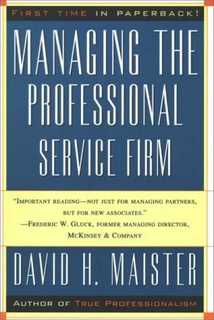anton maximov

reading: maister
managing the professional services firm is my second book on consulting (first one being weinberg’s secrets of consulting).

i have been resisting the temptation to gobble up the whole book in one sitting. i am taking it slowly, giving myself time to think through each chapter, since every one is loaded with so much insight and relevant quotes, that at times i even get frustrated, not able to take it all in.
it has it all – from marketing to clients, finding work, to running a consulting business, motivating and growing people. i am only half-way through, but i am tempted to label it as a required reading for anyone starting in consulting.
here’s a quote from “motivational crisis” chapter:
Are professionals different from other types of workers? Do they need to be managed (and motivated) in special ways? While it is difficult to support the assertion that all professionals are different from all other workers, my work has led me to suspect that, when it comes to motivating forces, the average professional is different from the average worker in other environments: a difference based, I suspect, not on such things as educational levels, but on the psyche of those who choose professional careers.
The typical professional is apt to describe him or herself in the following way: “I am the type of person who gets bored easily. I hate doing repetitive sorts of work, and always like to seek out new challenges. Once I know I can do something, it tends not to satisfy me anymore.” This is, of course, a somewhat self-flattering description. In my experience, however, it is an accurate one. Professionals, certainly the best among them, are constantly driven to seek out the new, the unfamiliar, the challenging. The key word here is driven.
People who feel the (neurotic?) need to constantly and repeatedly test their skills against unfamiliar problems with an uncertain probability of success are frequently insecure, with a low sense of self-worth (never expressed in public), in constant need of external tests of their merits to prove (to themselves) that they still “got it.”
Many professionals, I would assert, are prime examples of what is now termed “The Impostor Syndrome”—successful people who live in constant dread that someone will, one day, tap them on the shoulder and say “We’ve found you out. You’ve been faking it all these years.”
Because of this, professionals tend to exhibit some clearly defined behavioral characteristics. They require continual challenge and personal growth to retain their interest, and are impatient when they do not receive it. They constantly ask themselves, and their superiors, “Am I still on track?” Because of their insecurity, and the ambiguity that surrounds the definition of “good work” in professional contexts, they need quick, repeated feedback on their performance to validate their efforts. They tend to be “scoreboard-oriented”: eager for visible, well-defined measures of success that can reassure them. They like to have unambiguous goals to shoot at. From their need to achieve self-respect by receiving the respect of others, it follows that professionals value both autonomy in their work and involvement in policy decisions, whether on engagements or firm-management matters. As much as these “rewards” are valued in their own right, they are valued more as signs that the organization trusts and respects them.